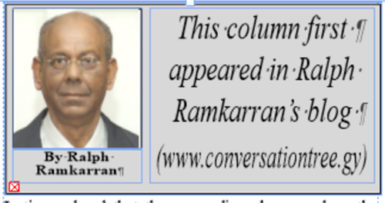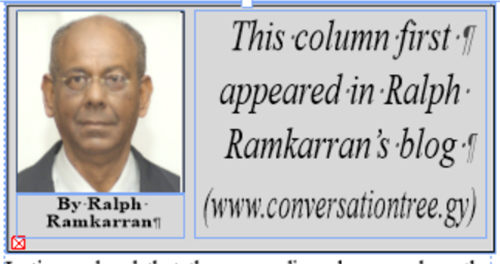Membership of our two main political parties does not necessarily imply that one is a  racist or subscribes to an ethnic approach to politics. The leaderships of both parties seriously strive, largely unsuccessfully, to broaden the leadership and membership of their parties. That they have not been successful has not modified their efforts. In the past when there was a clearer ideological distinction between the parties, it was even easier to justify the assertion that motivations for political activism were not ethnic, at least overtly. But supporters are recalcitrant.
racist or subscribes to an ethnic approach to politics. The leaderships of both parties seriously strive, largely unsuccessfully, to broaden the leadership and membership of their parties. That they have not been successful has not modified their efforts. In the past when there was a clearer ideological distinction between the parties, it was even easier to justify the assertion that motivations for political activism were not ethnic, at least overtly. But supporters are recalcitrant.
While no leader would tolerate ethnic slurs made by their supporters, they are always conscious of the fact that unacceptable language or characterizations in referring to another ethnic group is a common feature of Guyanese life and their supporters might falter. Strong measures should always be taken against such behaviour.
When Bill Marr, the white US TV host/comedian, liberal who was strongly anti-racist, and donated US$1 million to Obama’s election campaign, recently said light-heartedly while interviewing someone that he should not be considered a ‘house n***’, there was a national outcry. He barely kept his job and had to apologise and publicly atone.
One of his guests in his next show, the African American actor and rapper, Ice Cube, said that when that word is used in any context, except by African Americans who are now the owners of the word, and presumably are permitted to use it, “it’s like a knife.” Words of racist abuse feel the same way to every race and they do reflect a ‘personal philosophy.’
Issues relating to race, racial language and racial incitement are never far from our social and political processes.
The last two occasions when they gained great public attention were when Dr Roger Luncheon, then Head of the Presidential Secretariat, said in evidence in 2011 in a libel case brought by then President Jagdeo, that there were no Guyanese ambassadors of African descent, except Mrs Elizabeth Harper, because no African Guyanese was qualified to be appointed. There was a huge outcry, of course, and the then government was roundly accused by the APNU and other groups of racism.
The second occasion was during the last election campaign when the opposition alleged that certain statements used by Mr Bharrat Jagdeo constituted racial incitement. Mr Jagdeo’s statements, as well as some made by the opposition, were also criticized by the Carter Center. In an earlier period, Guyanese were aghast when Mr Desmond Hoyte reminded the security forces in 2002 that the rioting and disorderly people in the streets of Georgetown were their “kith and kin,” which appeared to suggest that rioters should be abetted because of race.
Guyana takes a serious view of racial discrimination and racial hostility. Racial discrimination is prohibited by article 149 of the Constitution. By the Racial Hostility Act passed in 1964, an era marked by racial disturbances and killings, a person is guilty of a criminal offence who excites or attempts racial hostility or ill-will against any section of the public or any person on the grounds of their or his or her race by means of words spoken in a public place or spoken and transmitted for general reception by wireless telegraphy or telegraph or by means of written or printed matter. The Prevention of Discrimination Act passed in 1997 prohibits discrimination on the grounds of race and for other reasons in employment, pay and in other areas. The seriousness with which the legislature has treated with the issue of race in its major aspects has not been reflected in the attitude of the population. The reason for this, and the reason why change would be slow and racial abuse and incitement would continue to be acceptable among many people, and would reflect their ‘personal philosophy,’ is because the ethnic divisions at the base of our society have determined and sustain its political superstructure. Unless the superstructure is wholly or partially dismantled, racial abuse will remain a part of our lives, reflective of our ‘personal philosophy.’
President Granger has the power in his hands to ameliorate the sharpness of racial or ethnic antagonism. APNU+AFC has proposed a package of constitutional reforms that includes: 1. The vice-president being the person who came second in the elections; 2. The sharing of the government with all political parties gaining over 15 per cent of the vote. I know as a fact that Prime Minister Moses Nagamootoo has always been as strong supporter of a political solution in the form of a coalition government between the two main political parties and would not stand in the way of such a solution.
There is therefore no obstacle to President Granger now immediately inviting former President Ramotar to be his Prime Minister and inviting the PPP/C to nominate 49 per cent of the members of the cabinet. Constitutional reform will in due course institutionalise this coalition. This new political dispensation will immediately reduce substantially the extent of racial or ethnic antagonism that exists in our society. It will not eliminate racial disharmony or abuse, but it will be a start. It will also lay the real foundation for reduced corruption and political stability.






